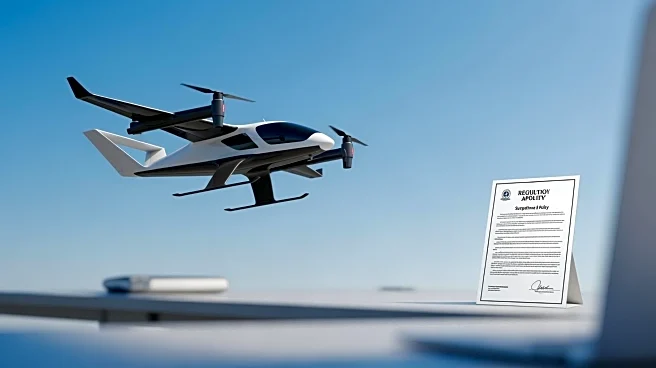What's Happening?
Archer Aviation, a California-based company, is making significant strides in the development of electric vertical take-off and landing (eVTOL) aircraft, commonly referred to as flying cars. CEO Adam Goldstein
highlights the advantages of eVTOLs over traditional helicopters, including lower noise levels, enhanced safety features, and reduced costs. Archer's flagship model, the Midnight, is designed to carry a pilot and up to four passengers, offering rapid flights over short to mid-distances. The company is nearing the final certification stage with the Federal Aviation Administration (FAA) and plans to launch commercial services in the United Arab Emirates and the United States. Archer has also been named the exclusive air taxi partner for the 2028 Los Angeles Olympics, aiming to showcase its capabilities on a global stage.
Why It's Important?
The development of eVTOLs represents a potential revolution in urban transportation, offering a quieter, safer, and more cost-effective alternative to helicopters. This innovation could significantly impact urban mobility, reducing congestion and providing new solutions for emergency services and law enforcement. The support from regulatory bodies, including the FAA, and the endorsement from political figures like President Trump, underscore the strategic importance of maintaining U.S. leadership in aviation technology. As battery technology advances, eVTOLs could become more prevalent, potentially transforming the landscape of urban transportation and creating new economic opportunities.
What's Next?
Archer plans to expand its operations, with commercial launches in the UAE and U.S. cities like Los Angeles and San Francisco. The company is also working towards achieving full autonomy for its eVTOLs, which could further enhance their appeal and utility. As regulatory frameworks evolve and public acceptance grows, eVTOLs may become a common sight in urban skies, necessitating infrastructure development and new air traffic management solutions.
Beyond the Headlines
The rise of eVTOLs could have broader implications for urban planning and environmental policy. Their quieter operation may lead to changes in zoning laws and noise regulations, while their electric nature aligns with global efforts to reduce carbon emissions. The technology also raises questions about airspace management and the integration of autonomous vehicles into existing transportation networks.









